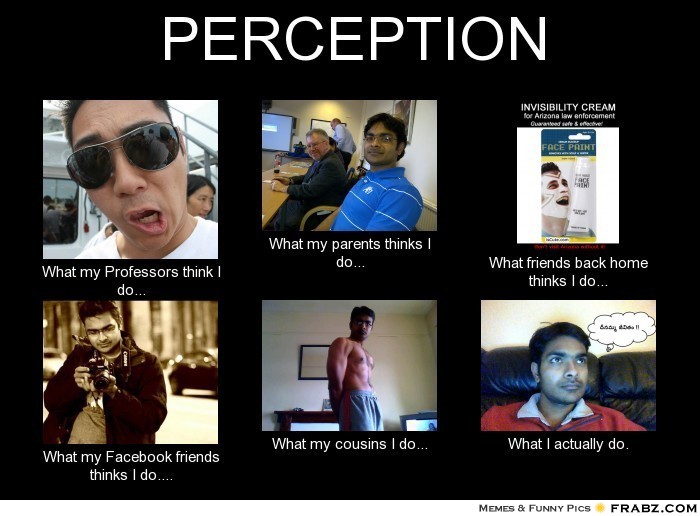There are more and more social media platforms gaining ground year by year and people are automatically joining them with either the same online identity they already have, or with several new ones.
However, which is the more beneficial approach?
Should we use the same profile with our real name for all of our online presence, as that shows a clear and authentic introduction of ourselves (Electronic Frontier Foundation, 2015)?
Should we use separate fictional ones to each of them for protecting our real identity?
In this post I’m going to have a look at the pros and cons for both of them.
” So identity online is about the authoring of self as a living-out of these states of being, becoming, belonging and behaving through a range of everyday social and discursive practices that are connected with the body. Yet it is also about a close editing of self – those aspects of self chosen to be shared with the public.” (Thomas, 2007).
I really liked the way Angela Thomas phrased online identity, as people are quite selective in deciding what parts of themselves they are willing to share with the public and where. There are several social platforms for different purposes. People are using Facebook for personal reasons such as communication and entertainment, whereas they use LinkedIn as a perception strictly of their professional side.
Using the same online identity for all of our social presences ensures us an easy-to-manage usage of the Web. It also makes us easier to track, which is essentiel in today’s business life. According to Mark Zuckerberg, the chairman of Facebook; “the right way if you are online who you are offline”, and only the real identity means authenticity (Krotoski, 2012). Nevertheless, it is also beneficial for their business model, as of tracking and collecting data of the user’s digital footprints is much easier with having to look for always the same name or identity (Marwick, 2013).
However, this can be a real drawback at the same time, if the information gets into the wrong people’s hands.
Maintaining multiple identities, on the other hand, can be very time consuming. It is also disadvantageous for our presence with being less visible online, especially for employers.
But being unidentifiable means less opportunity to hack our systems and also gives anonymity, which can be extremely helpful against discrimination and stereotyping (Damiani, De Capitani diVimercati and Samarati, 2003).
Me personally would prefer using the same online identity everywhere, because from my point of view, if I use it carefully and responsibly enough, it can make a real impact on starting my career in business.
What about You?
References
Costa, C. and Torres, R. (2011). To be or not to be, the importance of Digital Identity in the networked society. Educação, Formação & Tecnologias – ISSN 1646-933X, [online] 0(0), pp.47-53. Available at: http://eft.educom.pt/index.php/eft/article/view/216/126 [Accessed 26 Feb. 2016].
Damiani, E., De Capitani diVimercati, S. and Samarati, P. (2003). Managing multiple and dependable identities. IEEE Internet Computing, 7(6), pp.29-37.
Electronic Frontier Foundation, (2015). Changes to Facebook’s “Real Names” Policy Still Don’t Fix the Problem. [online] Available at: https://www.eff.org/deeplinks/2015/12/changes-facebooks-real-names-policy-still-dont-fix-problem [Accessed 27 Feb. 2016].
Internetsociety.org, (2016). Privacy & Identity | Internet Society. [online] Available at: http://www.internetsociety.org/what-we-do/internet-technology-matters/privacy-identity [Accessed 26 Feb. 2016].
Krotoski, A. (2012). Online identity: is authenticity or anonymity more important?. [online] the Guardian. Available at: http://www.theguardian.com/technology/2012/apr/19/online-identity-authenticity-anonymity [Accessed 26 Feb. 2016].
Marwick, A. (2013). Online Identity in Companion to New Media Dynamics.
Thomas, A. (2007). Youth online. New York: Peter Lang.
Wikipedia, (2016). Mark Zuckerberg. [online] Available at: https://en.wikipedia.org/wiki/Mark_Zuckerberg [Accessed 26 Feb. 2016].
Media:
Featured picture: Pinterest, Frabz, Youtube/Ted Talk


Hi Theo,
It was great to read about the things you found and your opinion on the topic of online identity.
I wondered if you think that Zuckerbeg’s approach of requiring authentic names on web services is more beneficial for us the users in that we can build trust and reputation or better for the service providers who can make inferences from our data and sell to advertisers?
LikeLike
Hi Theo,
I love the picture you used depicting how different people view you, I was just wondering why you think these different groups of people view you differently? Is it because they all follow you on different social media sites and you reveal different part of your personality on each? Do you personally use your real name on all social media sites or are there some which you have a completely different identity on?
You clearly outline benefits and constraints of having multiple online personas but do you think that there is a certain type of person more suited to having multiple personas? You discuss about the data on us getting into the wrong hands, is there a type of person in particular who you think would be particularly vulnerable to this?
What is your opinion on the Zukerburg quote? Do you believe that he only wants us to have a singular identity to make things easier for his direct marketing?
LikeLike
Hi Theo
Firstly, you mention that using one online identity allows the ease of being tracked, especially in the business world. I would love to hear more about what the benefits of this are to a business. However, do you believe it is right for a business to track your online presence?
Additionally, you question whether we should use one constant profile or separate fictional ones. Do you then believe that creating multiple identities online means that they have to be fictional? In my opinion, if I were to create multiple identities online they would not be fictional, just partial identities of myself.
Moreover, to answer your closing question I would feel inclined to create two identities, a personal persona on Facebook and a professional persona on LinkedIn, as you explained in your post. I believe that with the increasing use of social media to screen potential employees, this is instinctive.
All in all, I really enjoyed your views on multiple online identities.
LikeLike